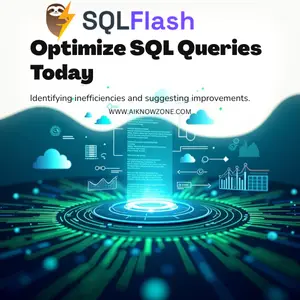SQLFlash
An in-depth review of SQLFlash, the AI-powered SQL optimization tool. Find out if it’s the right solution for your database performance needs.
Description
SQLFlash Review: AI to the Rescue for Slow SQL Queries!
Let’s face it, dealing with slow SQL queries can be a total drag. Hours spent manually tuning and optimizing can feel like a massive time sink. That’s where SQLFlash comes in – promising to be an AI-powered superhero that rewrites inefficient SQL, offers index recommendations, and analyzes execution plans. Forget endless tweaking; SQLFlash aims to automate the process, letting developers and DBAs focus on the stuff that truly matters. It’s like having a database expert in your pocket, ready to pounce on bottlenecks and boost performance with AI-driven precision. With promises of reducing manual optimization efforts by up to 90%, it definitely piqued my interest. I dove in to see if it lives up to the hype and whether it’s a must-have tool for anyone wrestling with database performance. Think of the possibilities: faster applications, happier users, and maybe even a little less stress for you!
Key Features and Benefits of SQLFlash
So, what exactly does SQLFlash bring to the table? Here’s a rundown of its key features and how they can benefit your workflow:
- AI-Driven Query Optimization: SQLFlash automatically rewrites slow SQL queries using AI. This helps improve performance without requiring manual intervention. It’s like having an AI co-pilot constantly looking for ways to make your queries run faster and smoother. No more staring at complex SQL trying to figure out where the issue lies; SQLFlash identifies and suggests optimizations in a snap.
- Actionable Index Recommendations: Get targeted index recommendations to further enhance query speed. These recommendations are tailored to your specific database and queries, ensuring maximum impact. Creating the right indexes can drastically reduce query times, but knowing which ones to create can be tricky. SQLFlash analyzes your database and provides clear, actionable advice.
- AI-Driven Execution Plan Analysis: SQLFlash analyzes query execution plans to identify potential bottlenecks. This makes it easier to understand what’s happening under the hood and address performance issues. Execution plans can be overwhelming, especially for complex queries. SQLFlash simplifies this process, highlighting the most critical areas for improvement and helping you fine-tune your database for optimal performance.
- Dynamic SQL Optimization: Optimizes dynamic SQL performance, which can be challenging to tune manually. Dynamic SQL is often used in applications where queries are constructed on the fly, making it difficult to optimize using traditional methods. SQLFlash tackles this challenge head-on, ensuring that your dynamic queries run as efficiently as possible.
How SQLFlash Works (Simplified)
Using SQLFlash seems straightforward. Essentially, you feed it your SQL query, and its AI engine gets to work. It analyzes the query, identifies potential bottlenecks, and then suggests optimized rewrites and index recommendations. Think of it as a smart assistant that takes the grunt work out of SQL optimization. You simply input your query, review the suggestions, and implement the changes. The tool integrates with various database systems, so you don’t have to worry about compatibility issues. Plus, the visual execution plan analysis helps you understand the ‘why’ behind the suggestions, making it easier to learn and improve your own SQL skills over time. It’s designed to be engineer-friendly, offering clear insights without requiring deep expertise.
Real-World Use Cases for SQLFlash
While I haven’t personally used SQLFlash in a production environment just yet, I can envision several scenarios where it would be a lifesaver. Based on the information I’ve gathered, here are a few practical examples:
- Boosting E-commerce Site Performance: Imagine an e-commerce site struggling with slow product catalog queries. SQLFlash could analyze these queries, recommend optimal indexes, and rewrite inefficient code to ensure faster loading times, improving user experience and potentially increasing sales. It could mean the difference between a frustrated customer leaving your site and a happy customer completing a purchase.
- Optimizing Financial Reporting: A financial institution could use SQLFlash to speed up complex financial reporting queries, ensuring timely and accurate data delivery for critical decision-making. Time is of the essence in finance, and SQLFlash could help shave precious minutes (or even hours) off report generation times.
- Enhancing Educational Platform Responsiveness: An online learning platform could leverage SQLFlash to optimize student progress tracking queries, providing real-time updates and a seamless learning experience, even under heavy load. A responsive platform keeps students engaged and motivated, leading to better learning outcomes.
Pros of SQLFlash
- AI-powered automation significantly reduces manual optimization efforts.
- Provides actionable index recommendations.
- Offers AI-driven execution plan analysis for better understanding.
- Supports optimization of dynamic SQL.
Cons of using SQLFlash
- Requires careful evaluation of AI-suggested rewrites to ensure they align with business logic.
- The effectiveness of optimizations may vary depending on the complexity of the SQL and database structure.
- Relies on OpenAI’s o1-preview model, which may have limitations or changes in the future.
SQLFlash Pricing
Pricing information for SQLFlash was not readily available in the search results. You’ll likely need to visit their website (sqlflash.ai) or contact them directly to get details on their pricing plans. It’s always a good idea to compare pricing with other SQL optimization tools to ensure you’re getting the best value for your needs.
Conclusion
In conclusion, SQLFlash appears to be a promising AI-powered SQL optimization tool that could be a game-changer for developers and DBAs struggling with database performance. Its AI-driven features, actionable recommendations, and dynamic SQL optimization capabilities offer a compelling solution for automating the tedious task of SQL tuning. While it’s essential to carefully evaluate AI-suggested changes, SQLFlash could significantly streamline your workflow and boost database performance. If you’re looking for a way to reduce manual optimization efforts and improve query speeds, SQLFlash is definitely worth exploring. 🚀 Give it a try and see if it can unlock the full potential of your databases! It seems particularly well-suited for teams dealing with complex SQL queries and large databases where manual optimization is time-consuming and challenging.





Reviews
There are no reviews yet.